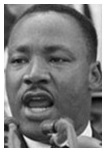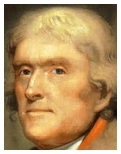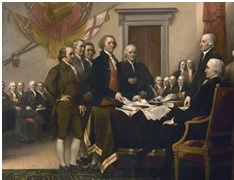|
 |
|
 |
|
|
||
Thomas Jefferson (1743-1826)
Third American president (pictured right) , who wrote his epitaph just before he died on Independence Day, July 4, describing all he wanted to be remembered for:
For more detail see... The American Declaration of Independence in the History Highlights section.
Why was he a great leader? 1. Vision and purpose His future ideal for America was based on democratic federal government (with power to each state), people’s rights (“life, liberty and the pursuit of happiness”), and their responsibilities. “The price of liberty is eternal vigilance”, he said. Jefferson's vision had a big influence on future American leaders like;
He particularly believed in:
His motto was “rebellion to tyrants is obedience to God”.
2. Integrity and charm He was a good man, charming and well liked with great humility, tolerance compassion and honesty. He lived by his ideals (see point 1) and tried unsuccessfully to abolish slavery. His anti-slavery clause in the Declaration of Independence was removed by Congress.
3. Pragmatic He was prepared to bend his principles a little to help America like his bargain purchase of Louisiana from France. 4. Lifelong learner and thinker He never stopped learning from:
Jefferson was not only a politician but also a mathematician, a lawyer, philosopher, farmer, musician and inventor. He was an intellectual who loved thinking and reflecting to improve his knowledge. He believed that education, information and freedom of thought were vital.
5. Communication Jefferson (pictured right in 1805) had little contact with ordinary people He rarely made speeches and disliked spoken argument. But he managed to communicate to them his concern for their well-being through:
6. Political skill He was a great politician because of:
7. Foresight He supported policies which looked to the future as well as the present. As in his Declaration of Independence (pictured right - Jefferson is central in the red waistcoat), he preferred dreams of the future to the history of the past.
8. Determination He managed to overcome strong attacks from his political opponents and the tragedy of his wife’s death in 1782.
9. Peace of mind He had a tranquillity which came from:
Key quotes on learning and wisdom Almighty God has created the mind free (from the Virginian statute for religious freedom) A little rebellion, now and then, is a good thing.
Key quote on America We hold these truths to be self-evident: that all men are created equal; that they are endowed by their Creator with certain unalienable rights; that among these are Life, Liberty and the pursuit of Happiness (from the Declaration of Independence)
Key quote on success Do you want to know who you are? Don’t ask. Act! Action will delineate and define you.
Key quote on positive thinking Nothing can stop the man with the right mental attitude from achieving his goal; nothing on earth can help the man with the wrong mental attitude.
Key quotes on politics and government Information is the currency of democracy (so, he said, Ignorance is the enemy of democracy) The whole art of government consists in the art of being honest. Government is the strongest of which every man feels a part. “The democracy will cease to exist when you take away from those who are willing to work and give to those who would not”. When the people fear their government, there is tyranny; when the government fears the people, there is liberty.
Key quote on ethics Only aim to do your duty, and mankind will give you credit where you fail.
Key quote on decision making Delay is preferable to error.
Key quote on the past, present and future I like the dreams of the future better than the history of the past.
Key quote on happiness The glow of one warm thought is to me worth more than money.
Henry David Thoreau (pictured right) said “Government is best which governs least”, but there is no record of Jefferson saying it (although many people think he did).
|
|
|
||
|
|
||
| Copyright © wisdomtowin.com 2025 All Rights Reserved | ||
|











